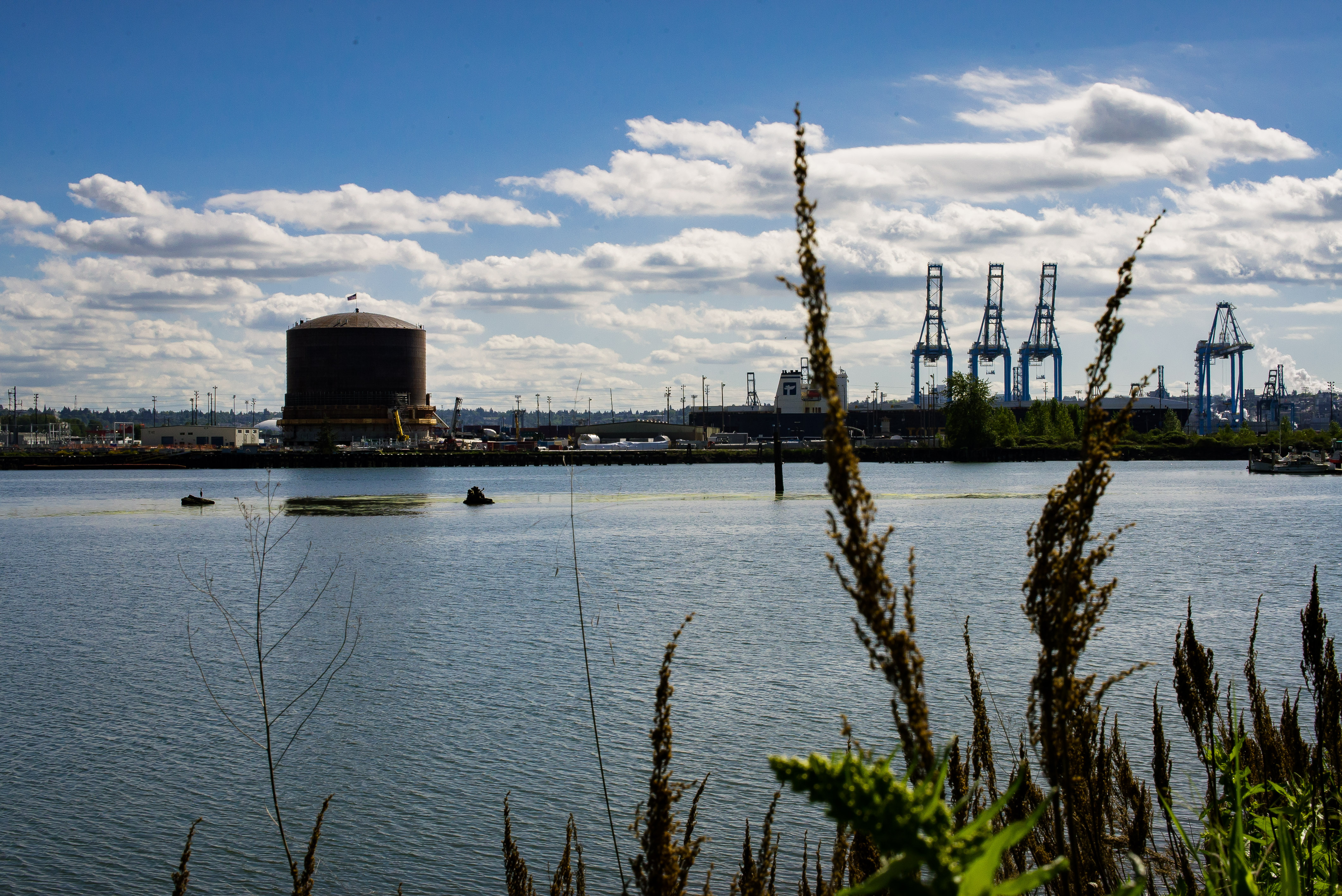“There are no alternative renewable options that reduce or eliminate greenhouse emissions except for the projects [Inslee] is now opposing.” TNT
This is a false choice. In fact, doing nothing is better for the climate than building these projects. As the governor pointed out, we do not have the luxury of time: we cannot build new fossil fuel infrastructure that will operate for 30 to 50 more years. The only responsible way to address climate change is to transition away from fossil fuels – including natural gas – as quickly as possible.
Already, ships are able to plug into shore power while they are berthed in Tacoma instead of running their engines. And the governor’s new budget will fund electrification for some of the state ferry fleet – a promising technology that can drastically reduce maritime fuel use and pollution.
“The use of LNG over bunker fuel will reduce greenhouse emissions by more than 30 percent and particulate matter by more than 90 percent.” TNT
These figures are wild distortions of the facts. The alleged greenhouse gas reductions are the result of completely ignoring the short-term effects of methane leakage and by using a methodology so favorable to the gas industry that not even the Trump Administration supports it. In fact, an honest accounting shows that the project would significantly increase greenhouse gas emissions over business as usual.
The alleged air pollution benefits are also misleading because they are based on cherry-picked data. The TOTE vessels might reduce one source of their pollution by 90 percent, but keep in mind that these vessels represent a minuscule fraction of Tacoma’s air pollution. (In fact, these vessels are only a tiny fraction of the ships that call at Tacoma, so the plan does not even make a size-able difference in shipping-related air pollution.) And the project’s other polluting operations might easily increase air pollution in Tacoma because plans call for using diesel-power trucks and trains to transport LNG to other buyers in the region.
“The benefits of switching to LNG also extend to eliminating the potential for a catastrophic fuel spill. If LNG were to spill on the water, the product simple evaporates with no environmental damage.” – TNT
When LNG spills and evaporates it causes direct environmental damage because it is nearly pure methane and therefore very harmful to the climate. In fact, over the course of a century a gram of methane warms the atmosphere as much as 30 grams of carbon dioxide. On a 20-year time frame, methane is 86 times as damaging to the climate as CO2.
What’s more, LNG spills are exceedingly dangerous. A 2014 leak at a similar facility near Tri Cities resulted in an explosion that could be felt up to six miles away and that could be truly catastrophic in an urban environment like Tacoma’s.
“By switching to LNG, health outcomes will improve for works at the ports and for fence-line communities.” TNT
LNG is extraordinarily dangerous, and the Tacoma project would multiply the risks. It would pipe in natural gas, produce LNG, fuel vessels from the dock, bunker vessels in the harbor, and load LNG onto trucks (and possibly trains). Each of these activities hazardous by itself, and they become even more risky when conducted in a confined space in an urban environment with limited emergency response capabilities. That’s why human rights organizations are standing with fence-line communities like the Tribe to oppose the project.
“Inslee said he cannot support facilities enabling fossil-fuel consumption for decades, potentially after fossil-fuels are no longer necessary. But in this case, he’s actually accepting higher emissions to make a statement of principles.” ST
The governor’s view is consistent with the Tribe’s, and it is the only view supported by current science: We must transition away from fossil fuels as rapidly as possible if we are to avoid catastrophic global warming. Two important things have changed since Inslee initially supported the project. First, the natural gas industry has gotten much more harmful to the climate (and to the environment generally) because it is deploying fracking and related technologies more often. Second, the scientific understanding of natural gas has evolved, and scientists now believe that it is far more damaging to the atmosphere than previously believed, perhaps even as bad as coal.
“There is no viable alternative now for cargo ships, which will continue to operate and play a key role in the state, national and global economies… Given that reality, the choice is not whether to to use fossil fuels, but which fossil fuels to use.” ST
Building new infrastructure to lock in many decades of fossil fuel use is a deeply irresponsible approach to climate change. The right approach is to clean up existing fuel sources as much as possible (something that California and international standards are already doing) and invest in research and development that can deliver genuinely low carbon shipping. That’s what Washington is doing with its ferry electrification initiative and what Pacific Northwest National Labs is doing with renewable fuels. Simply put, liquefied natural gas is not a solution.
“TOTE is converting ships and will have to barge gas from Canada, further increasing emissions, if Tacoma depot is blocked.” ST
We do not accept that TOTE can force us to choose between two bad options. There is little reason to think that barging gas from Canada to Tacoma makes any economic sense. It certainly doesn’t make sense for the climate or for public safety. The Tribe opposes new fossil fuel infrastructure in our ancestral homeland, just as other Tribes and First Nations do across Washington and British Columbia.
On July 22, 2019
Rebuttals to Recent Claims About Tacoma LNG

Related News

On December 20, 2021
Puyallup Tribe appeals Tacoma LNG decision
Read More
On December 2, 2021
Vice Chairwoman Miller shares the importance of our salmon, lands and waters at #WeArePugetSound event
Read More
On November 20, 2021

